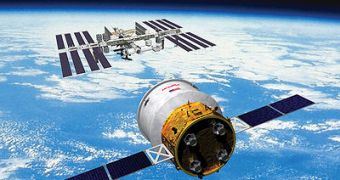The Orbital Sciences Corporation has recently signed a contract with Thales Alenia Space at the Paris Air Show, which states that, by the end of 2011, a new resupply spaceship would have to be constructed, which would bring food, drinks, scientific equipment and other cargo to the International Space Station. The deal was signed for nine Cygnus ships, with the first test flight scheduled in less than 21 months. The purpose of the flight is to demonstrate the technology to the American space agency NASA, and also to prove that the new spacecraft poses no danger to ISS astronauts.
“Cygnus has built into it all the critical safety features that are required for being in the vicinity of the space station. The standards are extremely stringent,” the Orbital project leader, Bob Richards, told the BBC News. The prototype pressurized vehicle will be launched in March of 2011, aboard a Taurus II rocket from Wallops Island, Virginia, the same news outlet informs. The craft in itself will be designed like a commercial freighter, and will resemble the outer makeup of the Russian Soyuz capsule in some aspects. However, as far as the technologies involved go, it will probably outrank its Russian competition in every aspect.
The launch sequence will be fairly simple, the two companies have announced. The delivery system will lift Cygnus to low-Earth orbit, from which it will have to travel to the ISS on its own. When it comes within ten meters (35 feet) of the station, astronauts inside will use the robotic arm to capture it, and guide it to its destined docking bay, the Harmony module. There, it will remain affixed to the laboratory, and will provide astronauts with the ability to enter and exit its confines at will, to unload all of their supplies, and replace them with trash.
“We are going to develop nine modules. The first is for the demonstration mission. Then we will supply eight others, two in what we call a 'standard configuration' and six in an 'enhanced configuration.' Cargo carrying capability for the standard module is two tonnes; and for the enhanced version, we will have the capability to go up to 2.7 tonnes,” Roberto Provera, of Thales Alenia Space, said.

 14 DAY TRIAL //
14 DAY TRIAL //